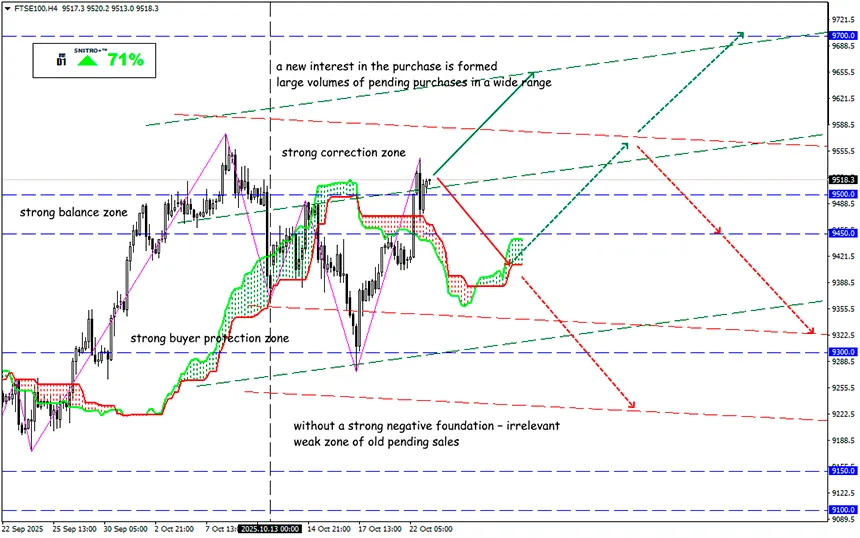The Pound Suffers but Fights Back

FTSE 100
Key zone: 9,450 -9,550
Buy: 9,550 (on a strong positive foundation); target 9,700-9,750; StopLoss 9,480
Sell: 9,400 (on a pullback after a retest of the 9,500 level); target 9,250; StopLoss 9,450
After a long pause, the United Kingdom published a full set of inflation data, which overall turned out to be softer than expected — this increases pressure on all GBP-linked assets and turns British equities against the global market. The stock market, represented by the FTSE 100, is only 1% away from its historical high and may renew it this week.
So:
- The consumer price index for September remained unchanged, maintaining an annual growth rate of 3.8%, compared with the expected acceleration to 4.0%.
- The core consumer price index slowed to 3.5% y/y from 3.6% in August and 3.8% in July.
The key source of instability in the British market was producer prices. These data had not been published since January due to a revision by the statistics agency.
Result:
- Overall dynamics are accelerating, but core producer prices are below average forecasts.
- Producer input prices increased by 0.7% y/y, while output prices grew by 3.4% y/y.
We are seeing a classic market reaction, where inflation weaker than market expectations triggers a reassessment of monetary policy prospects.
Reminder: the FTSE 100 is the market-cap-weighted index of LSE “blue chips” (UKX).
Major British companies remain cheaper than their US counterparts by key valuation multiples, while cash returns (dividends + buybacks) remain high. The yield/buyback strategy remains a visible support through 2026.
Since revenues are mainly denominated in foreign currency, a weaker British pound generally boosts profits and often the index level itself.
A renewed acceleration of inflation in the UK (and in the US too, but with a secondary effect) or a sharp rally in GBP would lead to a decline in valuation multiples and currency conversion effects. A stronger pound would also pressure earnings converted into GBP, given that over 80% of sales are generated abroad.
At the moment, the FTSE 100 is up 1.5% — the index has returned above 9500, a level it closed above only once before, on October 8. The stock market is supported by the pound’s weakness, linked to growing expectations of a softer monetary policy tone. Since April, the pound had quickly rebounded upward from the 1.3250 support level — now it is falling below that area.
As long as inflation continues to decline and the BOE’s key rate remains at 4% with a tendency toward easing, the “carry + low FTSE multiples” strategy remains attractive compared to expensive US analogs. Growth will require either improvement in China/commodities or a weaker pound sterling; downside risks include renewed rate hikes, weaker commodities, or tightening GBP momentum.
So we act wisely and avoid unnecessary risks.
Profits to y’all!

















